Reflective Learning: Gibbs Cycle, Feedback, and Future Assessments
VerifiedAdded on 2023/06/12
|8
|2064
|241
Essay
AI Summary
This essay delves into the concept of reflective learning, emphasizing its importance for students in higher education. It focuses on the Gibbs Reflective Cycle, detailing its six stages: description, feelings, evaluation, analysis, conclusion, and action plan. The essay elucidates how this cycle facilitates feedback and feedforward processes, enabling students to learn from past experiences and improve future formative and summative assessments. It highlights the significance of each stage in the Gibbs cycle, particularly the analysis stage for incorporating feedback and the action plan stage for implementing feedforward. By integrating both feedback and feedforward within the reflective practice, students can gain constructive criticism, identify areas for improvement, and develop actionable strategies for continuous academic growth, ultimately enhancing their overall performance in academic assessments. Desklib provides a platform to explore this essay along with numerous resources for students.
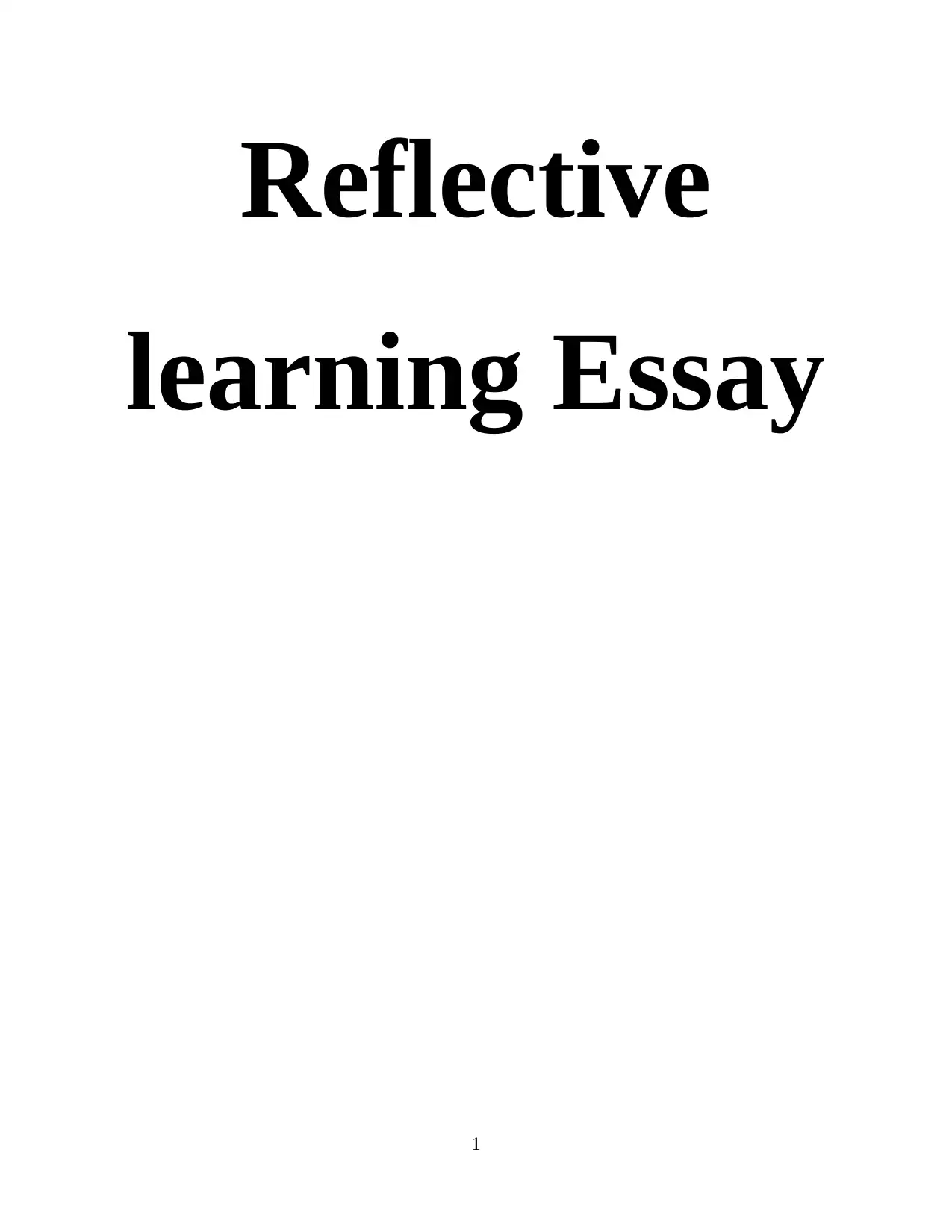
Reflective
learning Essay
1
learning Essay
1
Paraphrase This Document
Need a fresh take? Get an instant paraphrase of this document with our AI Paraphraser
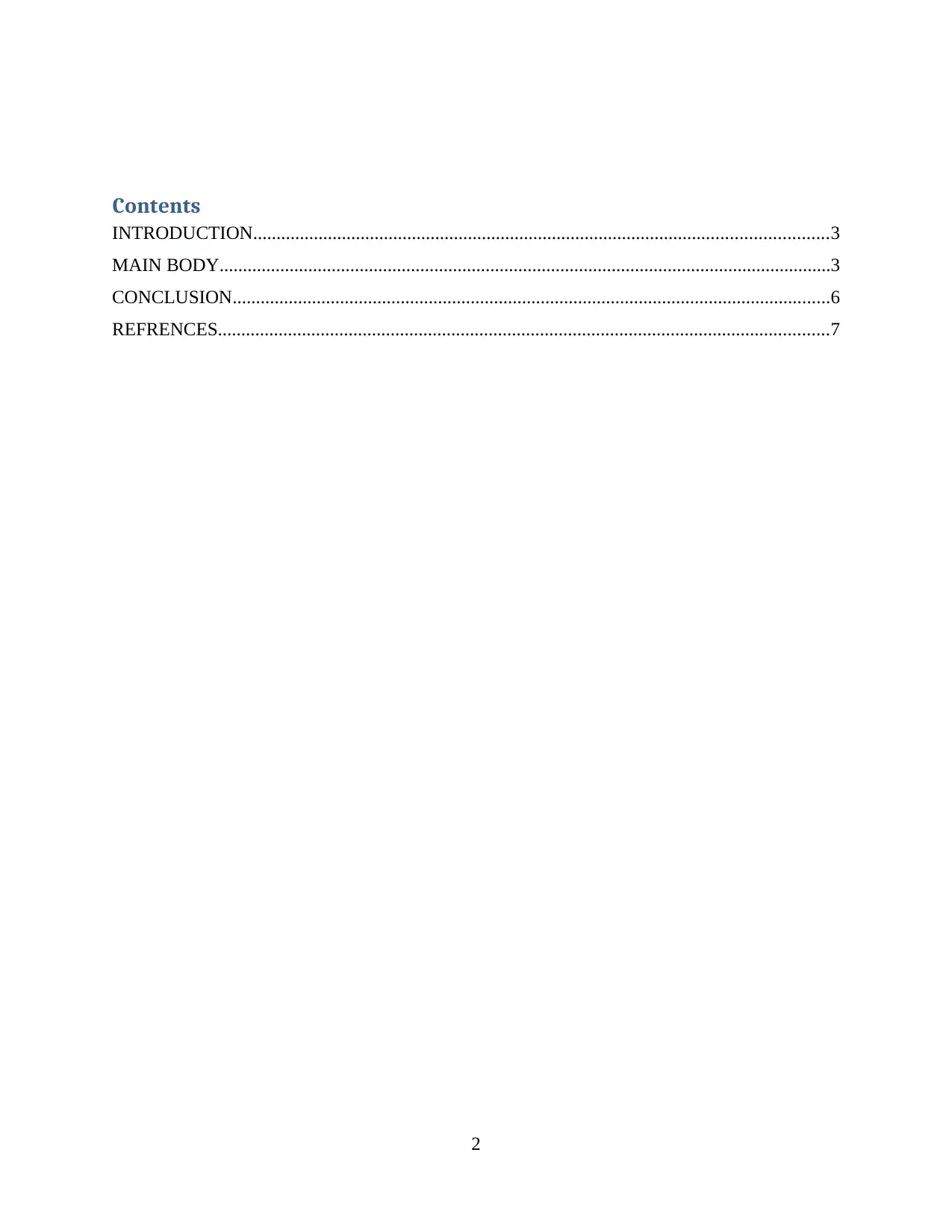
Contents
INTRODUCTION...........................................................................................................................3
MAIN BODY...................................................................................................................................3
CONCLUSION................................................................................................................................6
REFRENCES...................................................................................................................................7
2
INTRODUCTION...........................................................................................................................3
MAIN BODY...................................................................................................................................3
CONCLUSION................................................................................................................................6
REFRENCES...................................................................................................................................7
2

3
⊘ This is a preview!⊘
Do you want full access?
Subscribe today to unlock all pages.

Trusted by 1+ million students worldwide
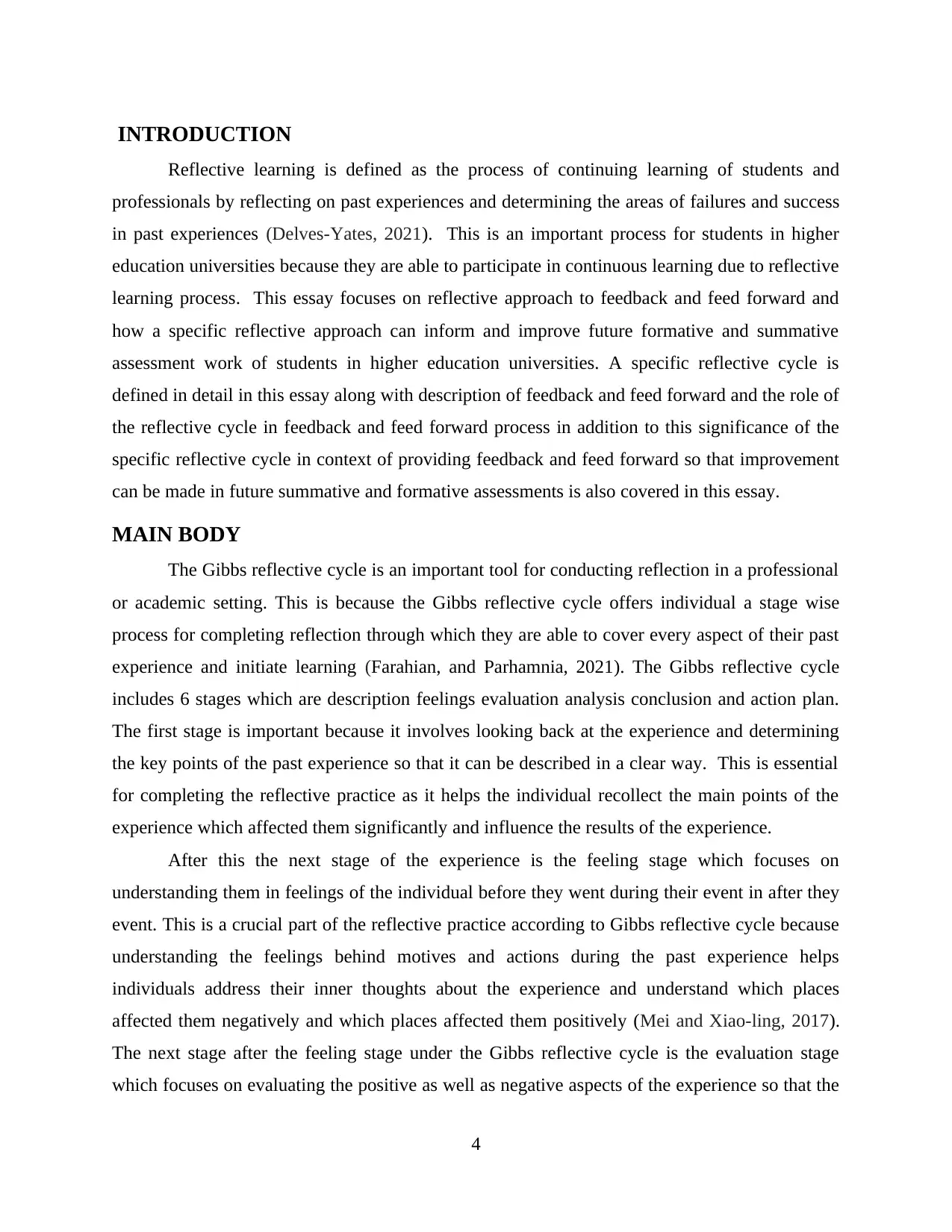
INTRODUCTION
Reflective learning is defined as the process of continuing learning of students and
professionals by reflecting on past experiences and determining the areas of failures and success
in past experiences (Delves-Yates, 2021). This is an important process for students in higher
education universities because they are able to participate in continuous learning due to reflective
learning process. This essay focuses on reflective approach to feedback and feed forward and
how a specific reflective approach can inform and improve future formative and summative
assessment work of students in higher education universities. A specific reflective cycle is
defined in detail in this essay along with description of feedback and feed forward and the role of
the reflective cycle in feedback and feed forward process in addition to this significance of the
specific reflective cycle in context of providing feedback and feed forward so that improvement
can be made in future summative and formative assessments is also covered in this essay.
MAIN BODY
The Gibbs reflective cycle is an important tool for conducting reflection in a professional
or academic setting. This is because the Gibbs reflective cycle offers individual a stage wise
process for completing reflection through which they are able to cover every aspect of their past
experience and initiate learning (Farahian, and Parhamnia, 2021). The Gibbs reflective cycle
includes 6 stages which are description feelings evaluation analysis conclusion and action plan.
The first stage is important because it involves looking back at the experience and determining
the key points of the past experience so that it can be described in a clear way. This is essential
for completing the reflective practice as it helps the individual recollect the main points of the
experience which affected them significantly and influence the results of the experience.
After this the next stage of the experience is the feeling stage which focuses on
understanding them in feelings of the individual before they went during their event in after they
event. This is a crucial part of the reflective practice according to Gibbs reflective cycle because
understanding the feelings behind motives and actions during the past experience helps
individuals address their inner thoughts about the experience and understand which places
affected them negatively and which places affected them positively (Mei and Xiao-ling, 2017).
The next stage after the feeling stage under the Gibbs reflective cycle is the evaluation stage
which focuses on evaluating the positive as well as negative aspects of the experience so that the
4
Reflective learning is defined as the process of continuing learning of students and
professionals by reflecting on past experiences and determining the areas of failures and success
in past experiences (Delves-Yates, 2021). This is an important process for students in higher
education universities because they are able to participate in continuous learning due to reflective
learning process. This essay focuses on reflective approach to feedback and feed forward and
how a specific reflective approach can inform and improve future formative and summative
assessment work of students in higher education universities. A specific reflective cycle is
defined in detail in this essay along with description of feedback and feed forward and the role of
the reflective cycle in feedback and feed forward process in addition to this significance of the
specific reflective cycle in context of providing feedback and feed forward so that improvement
can be made in future summative and formative assessments is also covered in this essay.
MAIN BODY
The Gibbs reflective cycle is an important tool for conducting reflection in a professional
or academic setting. This is because the Gibbs reflective cycle offers individual a stage wise
process for completing reflection through which they are able to cover every aspect of their past
experience and initiate learning (Farahian, and Parhamnia, 2021). The Gibbs reflective cycle
includes 6 stages which are description feelings evaluation analysis conclusion and action plan.
The first stage is important because it involves looking back at the experience and determining
the key points of the past experience so that it can be described in a clear way. This is essential
for completing the reflective practice as it helps the individual recollect the main points of the
experience which affected them significantly and influence the results of the experience.
After this the next stage of the experience is the feeling stage which focuses on
understanding them in feelings of the individual before they went during their event in after they
event. This is a crucial part of the reflective practice according to Gibbs reflective cycle because
understanding the feelings behind motives and actions during the past experience helps
individuals address their inner thoughts about the experience and understand which places
affected them negatively and which places affected them positively (Mei and Xiao-ling, 2017).
The next stage after the feeling stage under the Gibbs reflective cycle is the evaluation stage
which focuses on evaluating the positive as well as negative aspects of the experience so that the
4
Paraphrase This Document
Need a fresh take? Get an instant paraphrase of this document with our AI Paraphraser
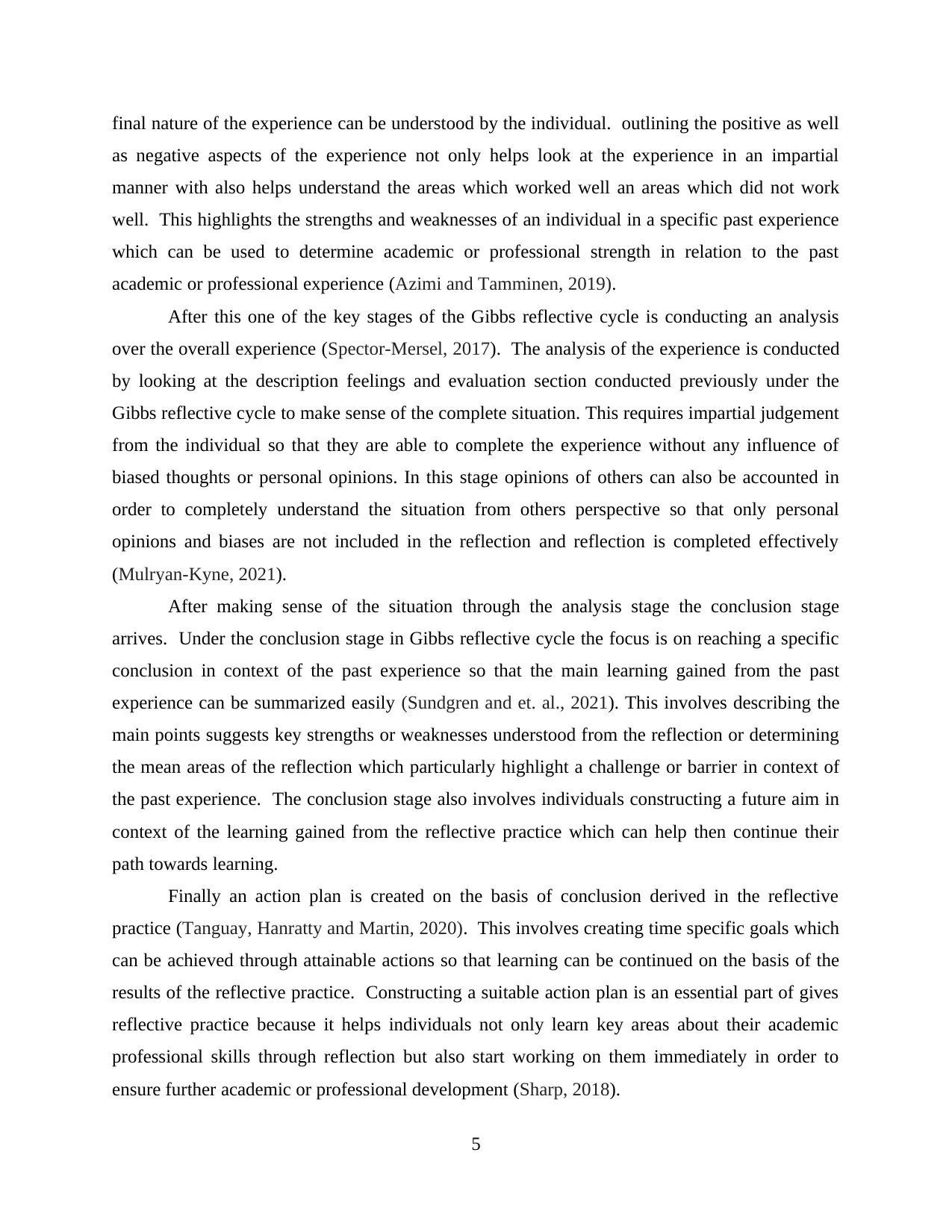
final nature of the experience can be understood by the individual. outlining the positive as well
as negative aspects of the experience not only helps look at the experience in an impartial
manner with also helps understand the areas which worked well an areas which did not work
well. This highlights the strengths and weaknesses of an individual in a specific past experience
which can be used to determine academic or professional strength in relation to the past
academic or professional experience (Azimi and Tamminen, 2019).
After this one of the key stages of the Gibbs reflective cycle is conducting an analysis
over the overall experience (Spector-Mersel, 2017). The analysis of the experience is conducted
by looking at the description feelings and evaluation section conducted previously under the
Gibbs reflective cycle to make sense of the complete situation. This requires impartial judgement
from the individual so that they are able to complete the experience without any influence of
biased thoughts or personal opinions. In this stage opinions of others can also be accounted in
order to completely understand the situation from others perspective so that only personal
opinions and biases are not included in the reflection and reflection is completed effectively
(Mulryan-Kyne, 2021).
After making sense of the situation through the analysis stage the conclusion stage
arrives. Under the conclusion stage in Gibbs reflective cycle the focus is on reaching a specific
conclusion in context of the past experience so that the main learning gained from the past
experience can be summarized easily (Sundgren and et. al., 2021). This involves describing the
main points suggests key strengths or weaknesses understood from the reflection or determining
the mean areas of the reflection which particularly highlight a challenge or barrier in context of
the past experience. The conclusion stage also involves individuals constructing a future aim in
context of the learning gained from the reflective practice which can help then continue their
path towards learning.
Finally an action plan is created on the basis of conclusion derived in the reflective
practice (Tanguay, Hanratty and Martin, 2020). This involves creating time specific goals which
can be achieved through attainable actions so that learning can be continued on the basis of the
results of the reflective practice. Constructing a suitable action plan is an essential part of gives
reflective practice because it helps individuals not only learn key areas about their academic
professional skills through reflection but also start working on them immediately in order to
ensure further academic or professional development (Sharp, 2018).
5
as negative aspects of the experience not only helps look at the experience in an impartial
manner with also helps understand the areas which worked well an areas which did not work
well. This highlights the strengths and weaknesses of an individual in a specific past experience
which can be used to determine academic or professional strength in relation to the past
academic or professional experience (Azimi and Tamminen, 2019).
After this one of the key stages of the Gibbs reflective cycle is conducting an analysis
over the overall experience (Spector-Mersel, 2017). The analysis of the experience is conducted
by looking at the description feelings and evaluation section conducted previously under the
Gibbs reflective cycle to make sense of the complete situation. This requires impartial judgement
from the individual so that they are able to complete the experience without any influence of
biased thoughts or personal opinions. In this stage opinions of others can also be accounted in
order to completely understand the situation from others perspective so that only personal
opinions and biases are not included in the reflection and reflection is completed effectively
(Mulryan-Kyne, 2021).
After making sense of the situation through the analysis stage the conclusion stage
arrives. Under the conclusion stage in Gibbs reflective cycle the focus is on reaching a specific
conclusion in context of the past experience so that the main learning gained from the past
experience can be summarized easily (Sundgren and et. al., 2021). This involves describing the
main points suggests key strengths or weaknesses understood from the reflection or determining
the mean areas of the reflection which particularly highlight a challenge or barrier in context of
the past experience. The conclusion stage also involves individuals constructing a future aim in
context of the learning gained from the reflective practice which can help then continue their
path towards learning.
Finally an action plan is created on the basis of conclusion derived in the reflective
practice (Tanguay, Hanratty and Martin, 2020). This involves creating time specific goals which
can be achieved through attainable actions so that learning can be continued on the basis of the
results of the reflective practice. Constructing a suitable action plan is an essential part of gives
reflective practice because it helps individuals not only learn key areas about their academic
professional skills through reflection but also start working on them immediately in order to
ensure further academic or professional development (Sharp, 2018).
5
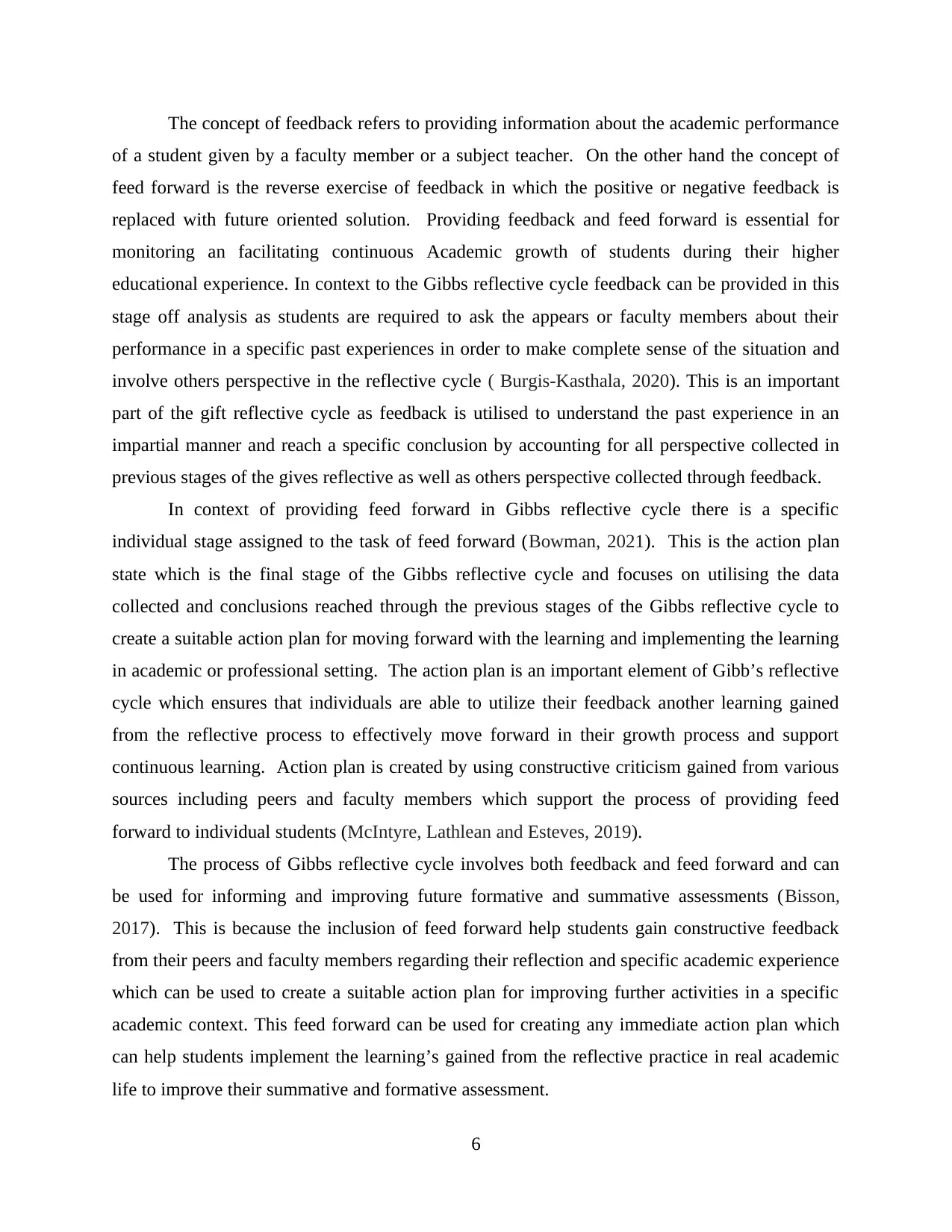
The concept of feedback refers to providing information about the academic performance
of a student given by a faculty member or a subject teacher. On the other hand the concept of
feed forward is the reverse exercise of feedback in which the positive or negative feedback is
replaced with future oriented solution. Providing feedback and feed forward is essential for
monitoring an facilitating continuous Academic growth of students during their higher
educational experience. In context to the Gibbs reflective cycle feedback can be provided in this
stage off analysis as students are required to ask the appears or faculty members about their
performance in a specific past experiences in order to make complete sense of the situation and
involve others perspective in the reflective cycle ( Burgis-Kasthala, 2020). This is an important
part of the gift reflective cycle as feedback is utilised to understand the past experience in an
impartial manner and reach a specific conclusion by accounting for all perspective collected in
previous stages of the gives reflective as well as others perspective collected through feedback.
In context of providing feed forward in Gibbs reflective cycle there is a specific
individual stage assigned to the task of feed forward (Bowman, 2021). This is the action plan
state which is the final stage of the Gibbs reflective cycle and focuses on utilising the data
collected and conclusions reached through the previous stages of the Gibbs reflective cycle to
create a suitable action plan for moving forward with the learning and implementing the learning
in academic or professional setting. The action plan is an important element of Gibb’s reflective
cycle which ensures that individuals are able to utilize their feedback another learning gained
from the reflective process to effectively move forward in their growth process and support
continuous learning. Action plan is created by using constructive criticism gained from various
sources including peers and faculty members which support the process of providing feed
forward to individual students (McIntyre, Lathlean and Esteves, 2019).
The process of Gibbs reflective cycle involves both feedback and feed forward and can
be used for informing and improving future formative and summative assessments (Bisson,
2017). This is because the inclusion of feed forward help students gain constructive feedback
from their peers and faculty members regarding their reflection and specific academic experience
which can be used to create a suitable action plan for improving further activities in a specific
academic context. This feed forward can be used for creating any immediate action plan which
can help students implement the learning’s gained from the reflective practice in real academic
life to improve their summative and formative assessment.
6
of a student given by a faculty member or a subject teacher. On the other hand the concept of
feed forward is the reverse exercise of feedback in which the positive or negative feedback is
replaced with future oriented solution. Providing feedback and feed forward is essential for
monitoring an facilitating continuous Academic growth of students during their higher
educational experience. In context to the Gibbs reflective cycle feedback can be provided in this
stage off analysis as students are required to ask the appears or faculty members about their
performance in a specific past experiences in order to make complete sense of the situation and
involve others perspective in the reflective cycle ( Burgis-Kasthala, 2020). This is an important
part of the gift reflective cycle as feedback is utilised to understand the past experience in an
impartial manner and reach a specific conclusion by accounting for all perspective collected in
previous stages of the gives reflective as well as others perspective collected through feedback.
In context of providing feed forward in Gibbs reflective cycle there is a specific
individual stage assigned to the task of feed forward (Bowman, 2021). This is the action plan
state which is the final stage of the Gibbs reflective cycle and focuses on utilising the data
collected and conclusions reached through the previous stages of the Gibbs reflective cycle to
create a suitable action plan for moving forward with the learning and implementing the learning
in academic or professional setting. The action plan is an important element of Gibb’s reflective
cycle which ensures that individuals are able to utilize their feedback another learning gained
from the reflective process to effectively move forward in their growth process and support
continuous learning. Action plan is created by using constructive criticism gained from various
sources including peers and faculty members which support the process of providing feed
forward to individual students (McIntyre, Lathlean and Esteves, 2019).
The process of Gibbs reflective cycle involves both feedback and feed forward and can
be used for informing and improving future formative and summative assessments (Bisson,
2017). This is because the inclusion of feed forward help students gain constructive feedback
from their peers and faculty members regarding their reflection and specific academic experience
which can be used to create a suitable action plan for improving further activities in a specific
academic context. This feed forward can be used for creating any immediate action plan which
can help students implement the learning’s gained from the reflective practice in real academic
life to improve their summative and formative assessment.
6
⊘ This is a preview!⊘
Do you want full access?
Subscribe today to unlock all pages.

Trusted by 1+ million students worldwide
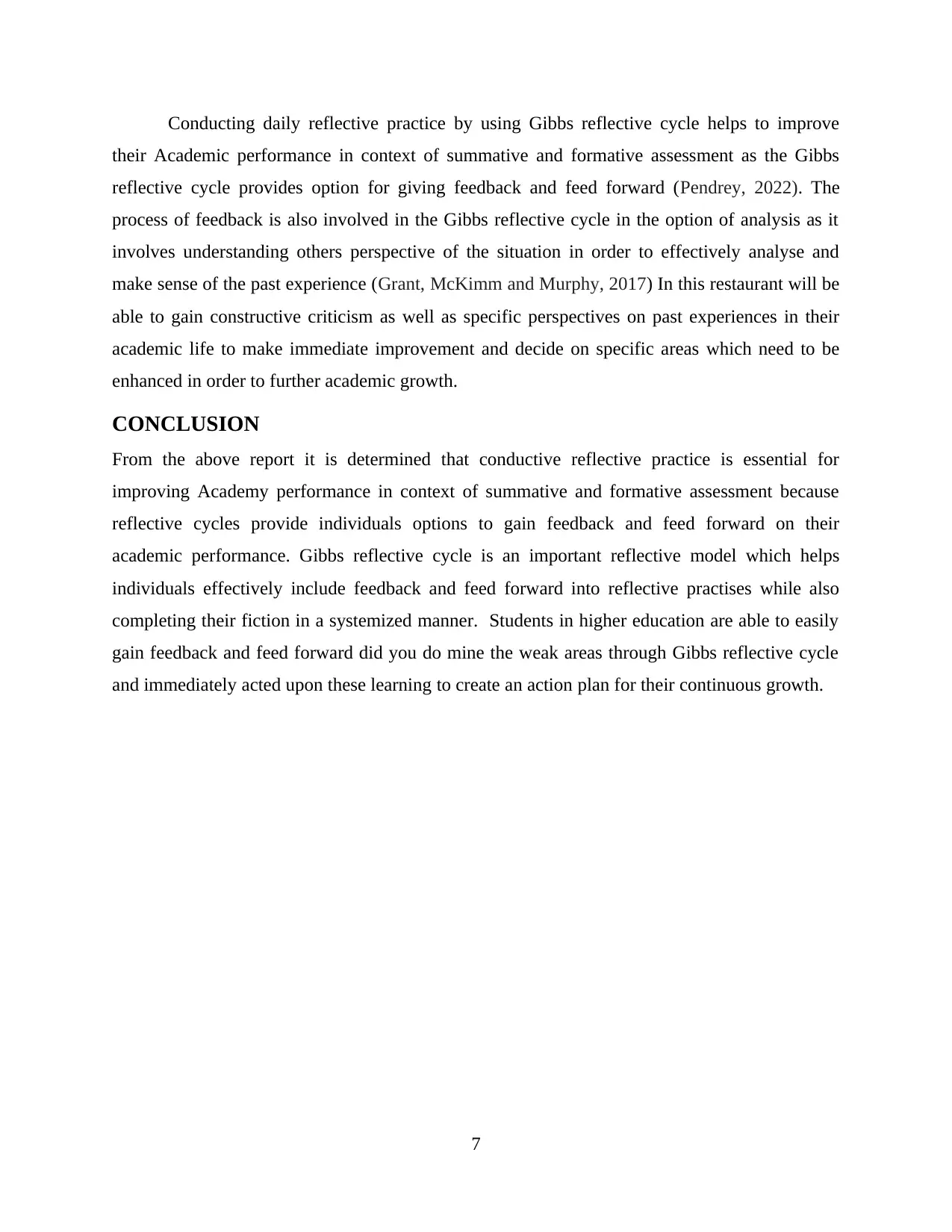
Conducting daily reflective practice by using Gibbs reflective cycle helps to improve
their Academic performance in context of summative and formative assessment as the Gibbs
reflective cycle provides option for giving feedback and feed forward (Pendrey, 2022). The
process of feedback is also involved in the Gibbs reflective cycle in the option of analysis as it
involves understanding others perspective of the situation in order to effectively analyse and
make sense of the past experience (Grant, McKimm and Murphy, 2017) In this restaurant will be
able to gain constructive criticism as well as specific perspectives on past experiences in their
academic life to make immediate improvement and decide on specific areas which need to be
enhanced in order to further academic growth.
CONCLUSION
From the above report it is determined that conductive reflective practice is essential for
improving Academy performance in context of summative and formative assessment because
reflective cycles provide individuals options to gain feedback and feed forward on their
academic performance. Gibbs reflective cycle is an important reflective model which helps
individuals effectively include feedback and feed forward into reflective practises while also
completing their fiction in a systemized manner. Students in higher education are able to easily
gain feedback and feed forward did you do mine the weak areas through Gibbs reflective cycle
and immediately acted upon these learning to create an action plan for their continuous growth.
7
their Academic performance in context of summative and formative assessment as the Gibbs
reflective cycle provides option for giving feedback and feed forward (Pendrey, 2022). The
process of feedback is also involved in the Gibbs reflective cycle in the option of analysis as it
involves understanding others perspective of the situation in order to effectively analyse and
make sense of the past experience (Grant, McKimm and Murphy, 2017) In this restaurant will be
able to gain constructive criticism as well as specific perspectives on past experiences in their
academic life to make immediate improvement and decide on specific areas which need to be
enhanced in order to further academic growth.
CONCLUSION
From the above report it is determined that conductive reflective practice is essential for
improving Academy performance in context of summative and formative assessment because
reflective cycles provide individuals options to gain feedback and feed forward on their
academic performance. Gibbs reflective cycle is an important reflective model which helps
individuals effectively include feedback and feed forward into reflective practises while also
completing their fiction in a systemized manner. Students in higher education are able to easily
gain feedback and feed forward did you do mine the weak areas through Gibbs reflective cycle
and immediately acted upon these learning to create an action plan for their continuous growth.
7
Paraphrase This Document
Need a fresh take? Get an instant paraphrase of this document with our AI Paraphraser
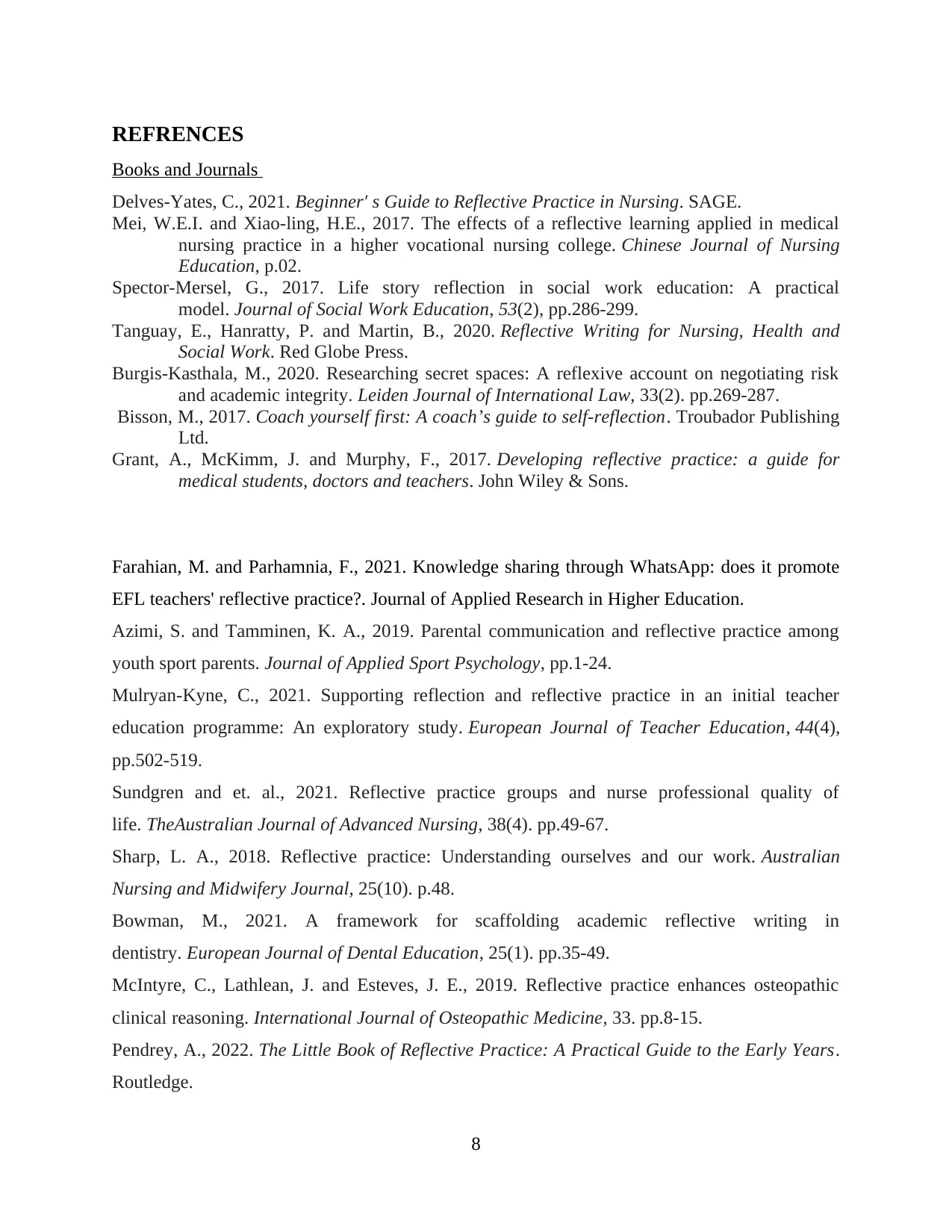
REFRENCES
Books and Journals
Delves-Yates, C., 2021. Beginner′ s Guide to Reflective Practice in Nursing. SAGE.
Mei, W.E.I. and Xiao-ling, H.E., 2017. The effects of a reflective learning applied in medical
nursing practice in a higher vocational nursing college. Chinese Journal of Nursing
Education, p.02.
Spector-Mersel, G., 2017. Life story reflection in social work education: A practical
model. Journal of Social Work Education, 53(2), pp.286-299.
Tanguay, E., Hanratty, P. and Martin, B., 2020. Reflective Writing for Nursing, Health and
Social Work. Red Globe Press.
Burgis-Kasthala, M., 2020. Researching secret spaces: A reflexive account on negotiating risk
and academic integrity. Leiden Journal of International Law, 33(2). pp.269-287.
Bisson, M., 2017. Coach yourself first: A coach’s guide to self-reflection. Troubador Publishing
Ltd.
Grant, A., McKimm, J. and Murphy, F., 2017. Developing reflective practice: a guide for
medical students, doctors and teachers. John Wiley & Sons.
Farahian, M. and Parhamnia, F., 2021. Knowledge sharing through WhatsApp: does it promote
EFL teachers' reflective practice?. Journal of Applied Research in Higher Education.
Azimi, S. and Tamminen, K. A., 2019. Parental communication and reflective practice among
youth sport parents. Journal of Applied Sport Psychology, pp.1-24.
Mulryan-Kyne, C., 2021. Supporting reflection and reflective practice in an initial teacher
education programme: An exploratory study. European Journal of Teacher Education, 44(4),
pp.502-519.
Sundgren and et. al., 2021. Reflective practice groups and nurse professional quality of
life. TheAustralian Journal of Advanced Nursing, 38(4). pp.49-67.
Sharp, L. A., 2018. Reflective practice: Understanding ourselves and our work. Australian
Nursing and Midwifery Journal, 25(10). p.48.
Bowman, M., 2021. A framework for scaffolding academic reflective writing in
dentistry. European Journal of Dental Education, 25(1). pp.35-49.
McIntyre, C., Lathlean, J. and Esteves, J. E., 2019. Reflective practice enhances osteopathic
clinical reasoning. International Journal of Osteopathic Medicine, 33. pp.8-15.
Pendrey, A., 2022. The Little Book of Reflective Practice: A Practical Guide to the Early Years.
Routledge.
8
Books and Journals
Delves-Yates, C., 2021. Beginner′ s Guide to Reflective Practice in Nursing. SAGE.
Mei, W.E.I. and Xiao-ling, H.E., 2017. The effects of a reflective learning applied in medical
nursing practice in a higher vocational nursing college. Chinese Journal of Nursing
Education, p.02.
Spector-Mersel, G., 2017. Life story reflection in social work education: A practical
model. Journal of Social Work Education, 53(2), pp.286-299.
Tanguay, E., Hanratty, P. and Martin, B., 2020. Reflective Writing for Nursing, Health and
Social Work. Red Globe Press.
Burgis-Kasthala, M., 2020. Researching secret spaces: A reflexive account on negotiating risk
and academic integrity. Leiden Journal of International Law, 33(2). pp.269-287.
Bisson, M., 2017. Coach yourself first: A coach’s guide to self-reflection. Troubador Publishing
Ltd.
Grant, A., McKimm, J. and Murphy, F., 2017. Developing reflective practice: a guide for
medical students, doctors and teachers. John Wiley & Sons.
Farahian, M. and Parhamnia, F., 2021. Knowledge sharing through WhatsApp: does it promote
EFL teachers' reflective practice?. Journal of Applied Research in Higher Education.
Azimi, S. and Tamminen, K. A., 2019. Parental communication and reflective practice among
youth sport parents. Journal of Applied Sport Psychology, pp.1-24.
Mulryan-Kyne, C., 2021. Supporting reflection and reflective practice in an initial teacher
education programme: An exploratory study. European Journal of Teacher Education, 44(4),
pp.502-519.
Sundgren and et. al., 2021. Reflective practice groups and nurse professional quality of
life. TheAustralian Journal of Advanced Nursing, 38(4). pp.49-67.
Sharp, L. A., 2018. Reflective practice: Understanding ourselves and our work. Australian
Nursing and Midwifery Journal, 25(10). p.48.
Bowman, M., 2021. A framework for scaffolding academic reflective writing in
dentistry. European Journal of Dental Education, 25(1). pp.35-49.
McIntyre, C., Lathlean, J. and Esteves, J. E., 2019. Reflective practice enhances osteopathic
clinical reasoning. International Journal of Osteopathic Medicine, 33. pp.8-15.
Pendrey, A., 2022. The Little Book of Reflective Practice: A Practical Guide to the Early Years.
Routledge.
8
1 out of 8
Related Documents
Your All-in-One AI-Powered Toolkit for Academic Success.
+13062052269
info@desklib.com
Available 24*7 on WhatsApp / Email
![[object Object]](/_next/static/media/star-bottom.7253800d.svg)
Unlock your academic potential
Copyright © 2020–2026 A2Z Services. All Rights Reserved. Developed and managed by ZUCOL.


